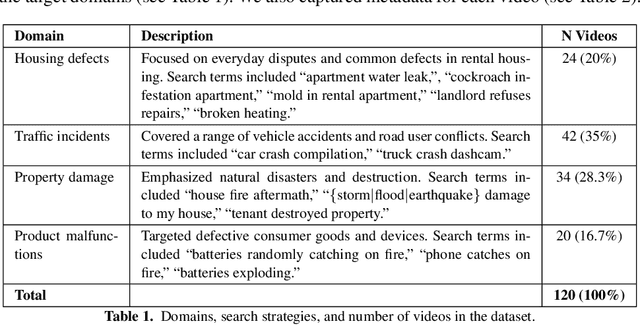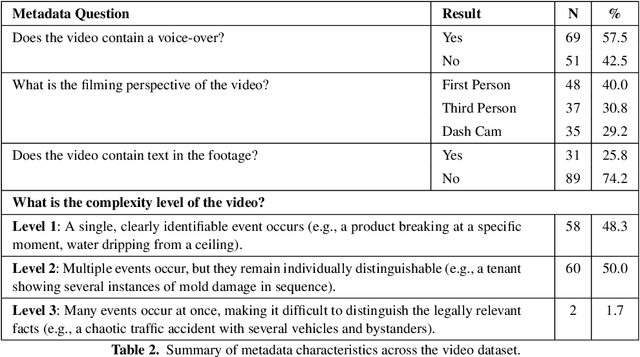Konrad Kollnig
Can LLMs Create Legally Relevant Summaries and Analyses of Videos?
Nov 15, 2025



Abstract:Understanding the legally relevant factual basis of an event and conveying it through text is a key skill of legal professionals. This skill is important for preparing forms (e.g., insurance claims) or other legal documents (e.g., court claims), but often presents a challenge for laypeople. Current AI approaches aim to bridge this gap, but mostly rely on the user to articulate what has happened in text, which may be challenging for many. Here, we investigate the capability of large language models (LLMs) to understand and summarize events occurring in videos. We ask an LLM to summarize and draft legal letters, based on 120 YouTube videos showing legal issues in various domains. Overall, 71.7\% of the summaries were rated as of high or medium quality, which is a promising result, opening the door to a number of applications in e.g. access to justice.
Are Companies Taking AI Risks Seriously? A Systematic Analysis of Companies' AI Risk Disclosures in SEC 10-K forms
Aug 26, 2025Abstract:As Artificial Intelligence becomes increasingly central to corporate strategies, concerns over its risks are growing too. In response, regulators are pushing for greater transparency in how companies identify, report and mitigate AI-related risks. In the US, the Securities and Exchange Commission (SEC) repeatedly warned companies to provide their investors with more accurate disclosures of AI-related risks; recent enforcement and litigation against companies' misleading AI claims reinforce these warnings. In the EU, new laws - like the AI Act and Digital Services Act - introduced additional rules on AI risk reporting and mitigation. Given these developments, it is essential to examine if and how companies report AI-related risks to the public. This study presents the first large-scale systematic analysis of AI risk disclosures in SEC 10-K filings, which require public companies to report material risks to their company. We analyse over 30,000 filings from more than 7,000 companies over the past five years, combining quantitative and qualitative analysis. Our findings reveal a sharp increase in the companies that mention AI risk, up from 4% in 2020 to over 43% in the most recent 2024 filings. While legal and competitive AI risks are the most frequently mentioned, we also find growing attention to societal AI risks, such as cyberattacks, fraud, and technical limitations of AI systems. However, many disclosures remain generic or lack details on mitigation strategies, echoing concerns raised recently by the SEC about the quality of AI-related risk reporting. To support future research, we publicly release a web-based tool for easily extracting and analysing keyword-based disclosures across SEC filings.
Exploring Antitrust and Platform Power in Generative AI
Jul 10, 2023Abstract:The concentration of power in a few digital technology companies has become a subject of increasing interest in both academic and non-academic discussions. One of the most noteworthy contributions to the debate is Lina Khan's Amazon's Antitrust Paradox. In this work, Khan contends that Amazon has systematically exerted its dominance in online retail to eliminate competitors and subsequently charge above-market prices. This work contributed to Khan's appointment as the chair of the US Federal Trade Commission (FTC), one of the most influential antitrust organisations. Today, several ongoing antitrust lawsuits in the US and Europe involve major technology companies like Apple, Google/Alphabet, and Facebook/Meta. In the realm of generative AI, we are once again witnessing the same companies taking the lead in technological advancements, leaving little room for others to compete. This article examines the market dominance of these corporations in the technology stack behind generative AI from an antitrust law perspective.
GreaseVision: Rewriting the Rules of the Interface
Apr 07, 2022



Abstract:Digital harms can manifest across any interface. Key problems in addressing these harms include the high individuality of harms and the fast-changing nature of digital systems. As a result, we still lack a systematic approach to study harms and produce interventions for end-users. We put forward GreaseVision, a new framework that enables end-users to collaboratively develop interventions against harms in software using a no-code approach and recent advances in few-shot machine learning. The contribution of the framework and tool allow individual end-users to study their usage history and create personalized interventions. Our contribution also enables researchers to study the distribution of harms and interventions at scale.
Mind-proofing Your Phone: Navigating the Digital Minefield with GreaseTerminator
Dec 20, 2021



Abstract:Digital harms are widespread in the mobile ecosystem. As these devices gain ever more prominence in our daily lives, so too increases the potential for malicious attacks against individuals. The last line of defense against a range of digital harms - including digital distraction, political polarisation through hate speech, and children being exposed to damaging material - is the user interface. This work introduces GreaseTerminator to enable researchers to develop, deploy, and test interventions against these harms with end-users. We demonstrate the ease of intervention development and deployment, as well as the broad range of harms potentially covered with GreaseTerminator in five in-depth case studies.
 Add to Chrome
Add to Chrome Add to Firefox
Add to Firefox Add to Edge
Add to Edge